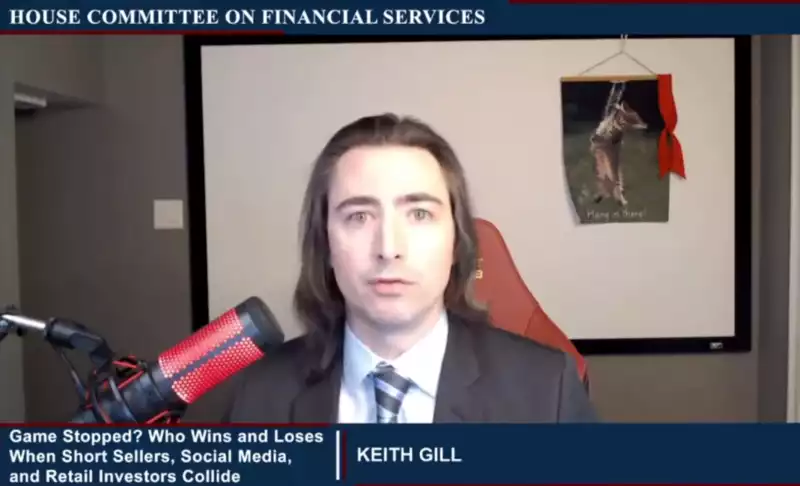Last month, GameStop's stock price swung wildly into the stratosphere, partly inspired by subreddits r/wallstreetbets and one user. Everyone panicked as to what the hell was going on: was this a victory for the little guy? The individual investor has won over the arrogant hedge fund. Is this a temporary anomaly? Is it legitimate?
No one knows all the answers yet, but what is certain is that many "little guys" lost a lot of money. And getting a little closer to what happened was the ostensible purpose of the congressional hearings that heard, among others, the testimony of Keith Gill.
Gill, aka redditor u/deepfuckingvalue, aka financial YouTuber Roaring Kitty, was one of GameStop's biggest and most prominent early investors before the stock price of the company soared to a peak just below $500 in late January. His public support of the stock, which peaked just below $500 in late January, is said to be the biggest factor in the current situation.
Congressional hearings are serious business on the one hand, but they are also a great opportunity to blurt out memes on the other. Gil testified in front of an image of a cat hanging by its paws, accompanied by the words "good luck" and a red bandana to give off a Rambo vibe. He also used streamer mics and sat in a gaming chair, specifically a Game of Thrones Lannister family-branded Secret Lab Omega.
The gags did not end there. One of the questions raised by some about Gill's role in the case is whether it is legal or counts as market manipulation to recommend stocks in which one investor is invested and provoke such an Internet reaction.
"There are a couple of things I'm not," Gill says. 'I am not a cat. I am not an institutional investor or a hedge fund. I don't have clients and I don't offer personalized investment advice for commission or fees. My investments in Game Stop and my social media posts are based on my own research and analysis."
The following clip shows Gill asking Congressman Bill Huizenga, "You recommended GameStop before, would you recommend GameStop now?"
The clip begins with him being asked the question. [and] my particular approach to investing is aggressive and may not be suitable for others, but it is for me."Huizenga could not help but laugh and asked, surprised, yes or no.
"For me personally," Gil stressed, "yes, I think it's an attractive investment at this price point."
Gill's bullishness caused a small spike in Gamestop's stock price, but this time it lasted only 30 minutes.
One of the major themes of the hearing was that Vladimir Tenev, CEO of investment app Robinhood, got a bit of a kick from the representatives about why the company itself is not a public company and that his platform temporarily prevents people from buying GameStop shares. That was that. But what the politicians wanted to know most about Gil was whether he had discovered some strange trick to fool the stock market.
Congressman Blaine Rutkemeyer asked Gill if his success lay in somehow "outsmarting" the system, to which Gill replied: "My specialty is business analysis, business fundamentals, not the internal structure of markets.
Gill spoke about these fundamentals early in the hearing: "GameStop stores still offer real value to consumers and provide solid revenue for GameStop.
His written evidence shows the timeline of his own investment: "In early June 2019, GameStop's stock price fell due to worse than expected earnings and began trading at a significant discount to what I consider fair value. I knew from public reports that Michael Barry, a well-known investor, was interested in GameStop. Believing the stock was undervalued, I purchased a call option on June 7, 2019. As I continued to analyze the company and its three prospects, I increased my position throughout 2019 and most of 2020 as I became increasingly convinced that the stock was indeed dramatically undervalued."
Gill continued, writing that, in his opinion, "the market had underestimated the future of Gamestop's legacy business and overestimated its potential for bankruptcy."
The entire hearing took over four hours, but it's not worth watching the whole thing (but here it is). Toward the end, Gil was basically asked if he thought there was anything wrong with small investors banding together like this via social media.
"Investing in stocks is incredibly risky and I would recommend doing your own thorough research before investing.
"That said, I tend to agree with Rep. People should be free to express their opinions about a stock, and they should be free to buy or not buy that stock based on those opinions.This hearing was the first of three congressional hearings on what happened with GameStop stock in January. Perhaps the best summary of the situation so far is Gill's written submission to Congress:
"Others will have to explain what happened in January. Threshold lists, order flow, halt of purchases - according to the media, these all had a significant impact on GameStop stock in January. The problem here is that I have a little experience, but even I understand very little about these matters. I am grateful that this committee is examining what happened.
.

Comments